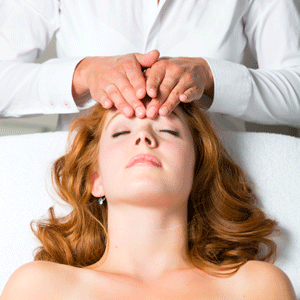
Does Reiki really work? Reiki is a Japanese technique that has now spread worldwide, which helps to reduce stress and promote healing. It is made up of 2 words: “Rei", which means "Higher Power", and “Ki”, which means “Life force energy”.
Reiki treatment is administered through the hands of a Reiki practitioner. The aim of Reiki is to balance a patient’s life force energy.
Life force energy, according to Reiki, is what flows through us and what makes us alive. When an individual has low life force energy, they are more likely to get sick, feel stress or suffer from depression.
Reiki has been said to alleviate the following ailments:
- Stress and tension
- Pain
- Detoxification
- Increase energy and vitality
- Increase spiritual growth
While Reiki has received numerous success stories, it is often blasted as nonsense.
It is not considered a proper science because it provides no physical evidence of success (some may say that it has a placebo effect - that people who believe in and have had Reiki treatments may convince themselves that it has worked), and because it works on spiritual assumptions rather than medical techniques.
Numerous studies and experiments have been carried out in order to prove that Reiki is a legitimate healing technique. The only real way to find out if a medical therapy works is by using a double blind, placebo-controlled trial.
Unfortunately in Reiki therapy, a double blind study is not really possible as the Reiki professional will know whether he or she is administering real Reiki versus fake Reiki. With Reiki studies, then, a single blind study has to be done. This means that participants alone do not know whether or not they are receiving real or fake Reiki. A blinded observer (individual observer who does not know whether it is real or fake) is also involved.
Unfortunately, results have been mixed and no definite scientific conclusions have been made.
Regardless, Reiki is becoming increasingly accepted into hospitals and clinics. While Reiki is not being used as a treatment on its own, some hospital physicians are using Reiki as a complementary addition to their treatment.
Whether you believe in the healing powers of Reiki or now, it is becoming more mainstream in the sphere of natural medicine, and at best, it renders no negative side effects.
If you want to give Reiki a try, always consult your doctor first, and rather use it as an addition to your medical therapy as opposed to on its own.
What are your thoughts and experiences on Reiki? Are the positive effects a result of the treatment itself, or the power of the mind? Let us know in the comments.
Follow Women24 on Twitter and like us on Facebook.
Reiki treatment is administered through the hands of a Reiki practitioner. The aim of Reiki is to balance a patient’s life force energy.
Life force energy, according to Reiki, is what flows through us and what makes us alive. When an individual has low life force energy, they are more likely to get sick, feel stress or suffer from depression.
Reiki has been said to alleviate the following ailments:
- Stress and tension
- Pain
- Detoxification
- Increase energy and vitality
- Increase spiritual growth
While Reiki has received numerous success stories, it is often blasted as nonsense.
It is not considered a proper science because it provides no physical evidence of success (some may say that it has a placebo effect - that people who believe in and have had Reiki treatments may convince themselves that it has worked), and because it works on spiritual assumptions rather than medical techniques.
Numerous studies and experiments have been carried out in order to prove that Reiki is a legitimate healing technique. The only real way to find out if a medical therapy works is by using a double blind, placebo-controlled trial.
Unfortunately in Reiki therapy, a double blind study is not really possible as the Reiki professional will know whether he or she is administering real Reiki versus fake Reiki. With Reiki studies, then, a single blind study has to be done. This means that participants alone do not know whether or not they are receiving real or fake Reiki. A blinded observer (individual observer who does not know whether it is real or fake) is also involved.
Unfortunately, results have been mixed and no definite scientific conclusions have been made.
Regardless, Reiki is becoming increasingly accepted into hospitals and clinics. While Reiki is not being used as a treatment on its own, some hospital physicians are using Reiki as a complementary addition to their treatment.
Whether you believe in the healing powers of Reiki or now, it is becoming more mainstream in the sphere of natural medicine, and at best, it renders no negative side effects.
If you want to give Reiki a try, always consult your doctor first, and rather use it as an addition to your medical therapy as opposed to on its own.
What are your thoughts and experiences on Reiki? Are the positive effects a result of the treatment itself, or the power of the mind? Let us know in the comments.
Follow Women24 on Twitter and like us on Facebook.




 Publications
Publications
 Partners
Partners









